| Srl | Item |
| 1 |
ID:
164219


|
|
|
|
|
| Summary/Abstract |
IN THE SECOND QUARTER of the 19th century, there was still no agreement among political and diplomatic circles on consular services and functions. Some of its members insisted that consulates should remain commercial organizations that looked after the interests of the citizens rather than the state. Their opponents preferred to see them as political and diplomatic units designed to serve the state interests and the private interests of citizens.
|
|
|
|
|
|
|
|
|
|
|
|
|
|
|
|
| 2 |
ID:
149725
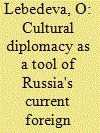

|
|
|
|
|
| Summary/Abstract |
This obviously also applies to Russia's current cultural diplomacy. Yevgeny Shmagin, Deputy Director of the Department on Cultural Affairs and Ties with UNESCO of the Russian Ministry of Foreign Affairs, underscores in his article "Culture and Diplomacy" published in International Affairs the importance of cultural diplomacy in implementing the state's foreign-policy strategy, maintaining, in particular, that "the union of diplomacy and culture has at all times served Russia's national interests, over and over again demonstrating its vitality at different stages in our history. It was cultural diplomacy with its specific set of instruments and methods to influence public opinion that was able to essentially dissolve the ice of hostile and sometimes openly biased attitudes with regard to our country during its Soviet period, mitigating the impact of various negative tendencies of political and ideological nature. During the formation of new Russian state, cultural initiatives once again helped strengthen the country's international prestige, its reputation, demonstrate the Russian society's openness, serve as an evidence of Russia's revival, and its development as a free and democratic state."
|
|
|
|
|
|
|
|
|
|
|
|
|
|
|
|
| 3 |
ID:
161082
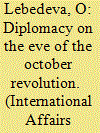

|
|
|
|
|
| Summary/Abstract |
THE FEBRUARY REVOLUTION of 1917 in Russia removed the regime of czarist autocracy from the stage; the Foreign Ministry, however, survived with minimal losses. The Provisional Government brought to power by the revolution was determined to follow the previous foreign policy course. The Foreign Ministry returned to the scene after four days of revolutionary turmoil even if the situation in the country looked more like a war than anything else which inevitably affected the ministry's functioning and the course it tried to follow. As could be expected, political power could not leave the ministry alone. Its interference in foreign policy had caused disagreements that gradually spread to the Provisional Government.
|
|
|
|
|
|
|
|
|
|
|
|
|
|
|
|
| 4 |
ID:
146285


|
|
|
|
|
| Summary/Abstract |
PUBLIC DIPLOMACY is today understood as the communication of the governmental and nongovernmental players of a country with foreign public in order to indirectly influence public opinion and foreign policy decisions in a foreign state. Public diplomacy methods and techniques have been used by various countries for centuries, but only in the 20th century did they begin to evolve into systematic national policies with substantial theoretical, legal, and logistic resources put into them.
|
|
|
|
|
|
|
|
|
|
|
|
|
|
|
|
| 5 |
ID:
189159
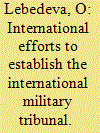

|
|
|
|
|
| Summary/Abstract |
CRIMES against humanity during World War II were common, and most of them were associated with Nazi Germany. A policy of brutal terror was implemented on occupied territories, involving the destruction of entire settlements and the use of scorched earth tactics.
|
|
|
|
|
|
|
|
|
|
|
|
|
|
|
|
| 6 |
ID:
167757


|
|
|
|
|
| Summary/Abstract |
RAPID technological development has accelerated globalization processes around the world, removing borders not only between countries but also between continents. The concept of soft power that America has been actively using in recent decades has exhausted its toolkit and requires new means of expression. This concept emphasizes not the military potential of a state but its cultural values, scientific achievements and diplomatic skill.
|
|
|
|
|
|
|
|
|
|
|
|
|
|
|
|
| 7 |
ID:
171263
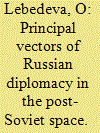

|
|
|
|
|
| Summary/Abstract |
THE DISINTEGRATION of the Soviet Union has led to a new geopolitical zone appearing on the world map - the so-called post-Soviet space where Russia plays a dominant role even though post-Soviet countries have different development paths, political regimes and economies. Amid the escalating relations between Russia and the West, the pressing problem for Russia right now is to build relations with its immediate neighbors.
|
|
|
|
|
|
|
|
|
|
|
|
|
|
|
|
| 8 |
ID:
177535
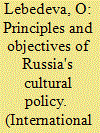

|
|
|
|
|
| Summary/Abstract |
A STUDY of the cultural policy of a country should involve studying the connection of the cultural life of that country with the political strategy of its government. Undoubtedly, the political course of a country is seriously affected by sociocultural factors that have evolved historically.
|
|
|
|
|
|
|
|
|
|
|
|
|
|
|
|
| 9 |
ID:
191024


|
|
|
|
|
| Summary/Abstract |
AMID the current international turbulence, there is a lot of talk about necessary changes to the foreign policy courses of certain countries. Such changes are impossible without qualitative adjustments to the diplomatic toolkit, the driver of a state's foreign policy. It is natural that today's Russian diplomatic service is also undergoing both regional and functional evolution.
This article will focus on the key challenges facing Russia's foreign policy and on methods of adapting Russia's diplomatic service to them, using the example of promoting one of the key ideologies of Russian diplomacy: the UN-centric world order...
|
|
|
|
|
|
|
|
|
|
|
|
|
|
|
|
| 10 |
ID:
152684


|
|
|
|
|
| Summary/Abstract |
THE START of the 21st century can with good reason be considered a landmark in the development of Russian public diplomacy. After the difficult and unpredictable 1990s, the Russian leadership began to pay serious attention to creating a positive international image for Russia.
|
|
|
|
|
|
|
|
|
|
|
|
|
|
|
|
| 11 |
ID:
180763


|
|
|
|
|
| Summary/Abstract |
GLOBALIZATION has led to the rapid development of information and communication technologies (ICTs) that impact modern society. ICTs influence international affairs, since they provide means of communication with the global audience in a worldwide format.
|
|
|
|
|
|
|
|
|
|
|
|
|
|
|
|
| 12 |
ID:
159275


|
|
|
|
|
| Summary/Abstract |
THE CREATION of the United Nations marked the end of the World War II and showed the entire world community the way to the peaceful diplomatic settling of conflicts. The work of the organization, created in 1945. was not limited exclusively to questions of war and peace. Prominent among the organization's aims, as laid down in its charter, was its creators' desire to strengthen international cooperation, raise the role of diplomacy, and establish dialogue in the processes of international relations.1 It should be noted here that the area of debate open to the representatives of the UN member countries was formulated to solve a wide variety of problems of the most diverse nature.
|
|
|
|
|
|
|
|
|
|
|
|
|
|
|
|
| 13 |
ID:
157267
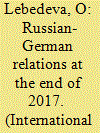

|
|
|
|
|
| Summary/Abstract |
THE LARGE AMOUNT of foreign policy work done by the Russian leadership in recent years has proven insufficient to fill gaps in social and economic statistics. This work mainly focused on measures to attract foreign investors and to raise the investment attractiveness of Russia. Measures to intensify cross-border movement of capital and attract "smart money" to Russia have been seriously impeded by economic determinism and overlooked many aspects of international relations.
|
|
|
|
|
|
|
|
|
|
|
|
|
|
|
|